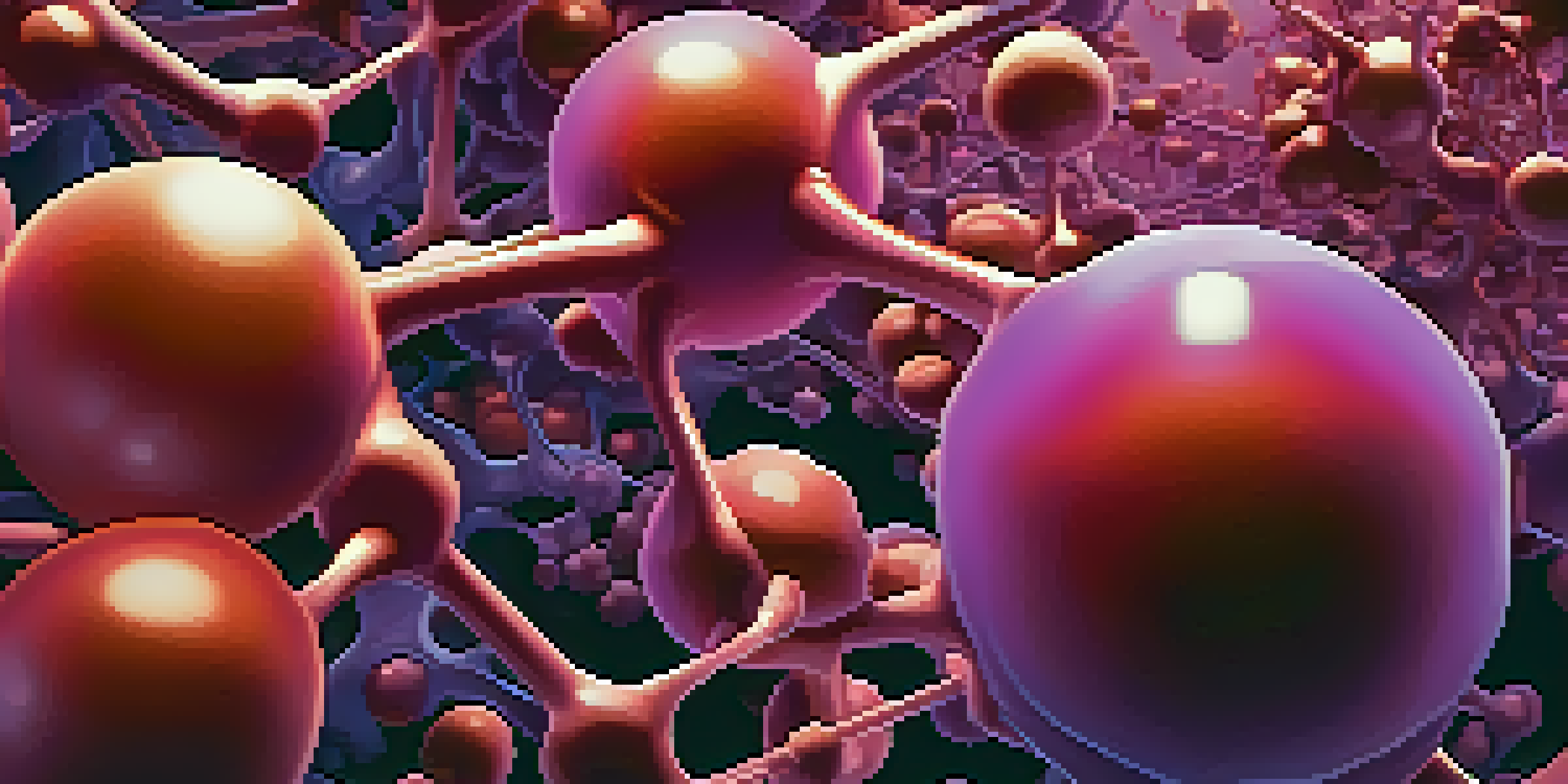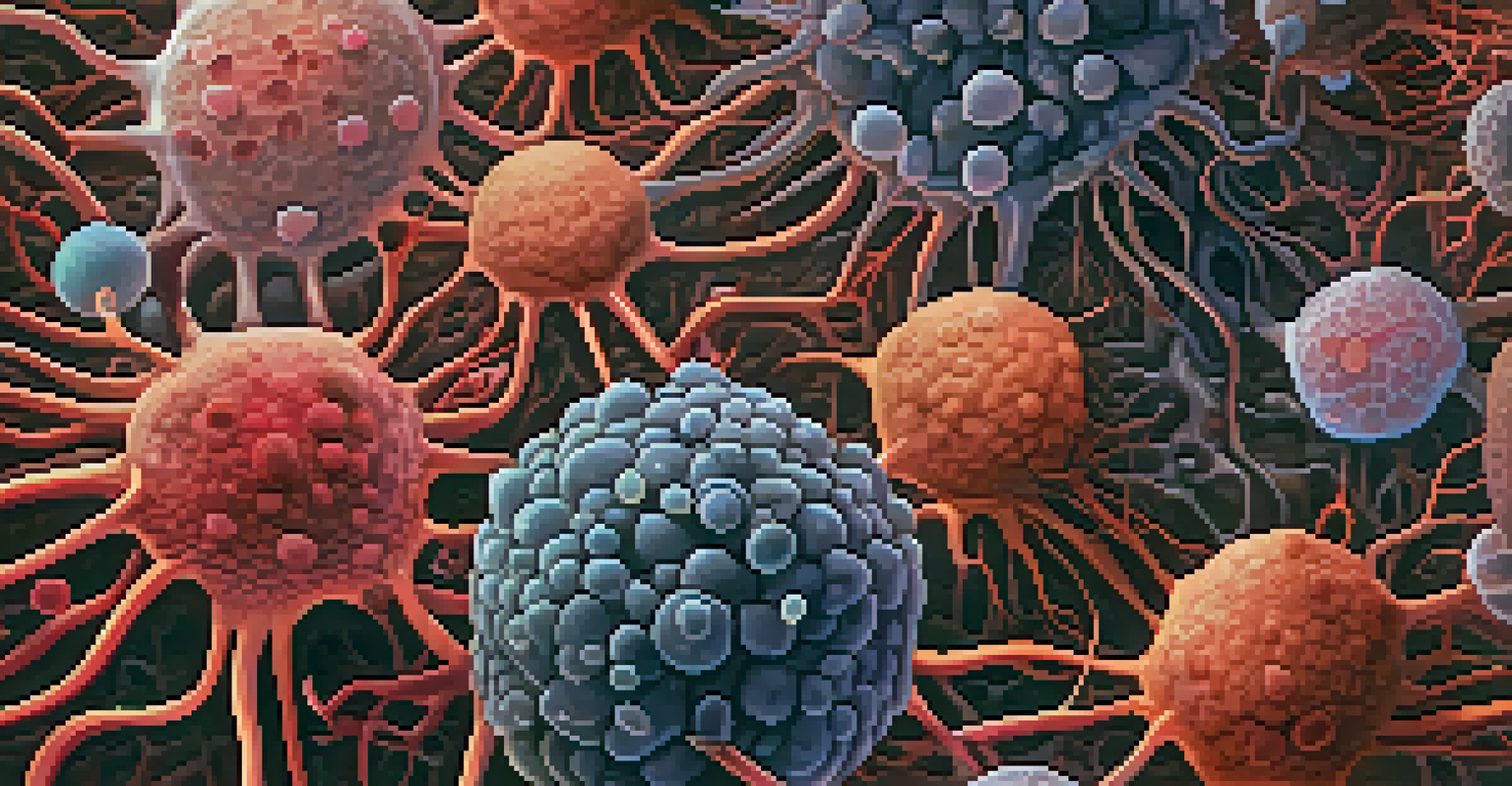Molecular Basis of Cancer: Insights for Therapeutic Targets

Understanding Cancer at the Molecular Level
Cancer begins at the molecular level, where normal cells undergo changes that lead to uncontrolled growth. These changes can be due to genetic mutations, environmental factors, or lifestyle choices. By studying these molecular alterations, researchers can identify how cancer cells differ from healthy cells. This understanding is crucial in developing targeted therapies that can specifically attack cancer cells while sparing normal ones.
The greatest weapon against stress is our ability to choose one thought over another.
For instance, mutations in genes like TP53 or KRAS can lead to tumor formation. These mutations can disrupt normal cell cycle regulation, leading to unchecked cell division. By identifying these specific mutations, scientists can create drugs that inhibit the pathways activated by these faulty genes. This targeted approach can result in more effective treatments with fewer side effects than traditional chemotherapy.
In essence, comprehending the molecular foundations of cancer not only sheds light on how the disease progresses but also opens doors to innovative treatment strategies. As we continue to unravel the complexities of cancer at the molecular level, the potential for developing more effective therapies grows exponentially.
Key Genetic Mutations Driving Cancer Progression
Certain genetic mutations play a pivotal role in the development and progression of various cancers. For example, BRCA1 and BRCA2 mutations are well-known for their association with breast and ovarian cancers. These genes are involved in repairing DNA damage, and when they are mutated, the risk of cancer increases significantly. Understanding these key players helps in identifying patients who may benefit from preventive measures or targeted treatments.

Moreover, mutations in oncogenes, like HER2 in breast cancer, can lead to aggressive tumor growth. Targeted therapies, such as trastuzumab, specifically block the activity of these oncogenes, providing a tailored approach to treatment. This not only enhances the effectiveness of the therapy but also minimizes harm to healthy cells, which is a significant advantage over conventional treatments.
Molecular Insights Drive Therapies
Understanding cancer at the molecular level allows researchers to develop targeted therapies that specifically attack cancer cells while sparing healthy ones.
By focusing on these critical genetic mutations, researchers can develop personalized medicine strategies that align with each patient's unique tumor profile. This personalized approach represents a shift towards more effective cancer therapies that can adapt to the specific genetic makeup of an individual's cancer.
The Role of Tumor Microenvironment in Cancer
The tumor microenvironment (TME) is a complex and dynamic ecosystem that surrounds cancer cells. This environment includes various cell types, signaling molecules, and blood vessels that can influence tumor growth and metastasis. Understanding the interactions within the TME is crucial, as it can either promote or inhibit cancer progression. For example, immune cells in the TME can sometimes help fight cancer, while at other times, they may inadvertently support tumor growth.
Cancer is not a single disease but a collection of diseases. Each disease has its own set of mutations and genes that drive its growth and spread.
Researchers are increasingly studying the TME to identify potential therapeutic targets. For instance, targeting the blood vessels that supply nutrients to the tumor has shown promise in clinical trials. By cutting off the tumor's blood supply, these therapies can effectively starve the tumor, reducing its size and spread.
Additionally, modifying the immune response within the TME represents another exciting avenue for therapy. Immune checkpoint inhibitors, which help the immune system recognize and attack cancer cells, have transformed treatment for several malignancies. Understanding the TME's role not only enhances our grasp of cancer biology but also guides the development of innovative therapeutic strategies.
Epigenetics: A New Frontier in Cancer Research
Epigenetics refers to the changes in gene expression that do not involve alterations to the underlying DNA sequence. These changes can be influenced by environmental factors, lifestyle, and even aging. In cancer, abnormal epigenetic modifications can silence tumor-suppressor genes or activate oncogenes, contributing to cancer development. This aspect of cancer biology highlights that genetics is not the only player in the game; the environment and lifestyle choices can significantly impact how genes are expressed.
For instance, the addition of methyl groups to DNA can prevent the expression of genes that would normally suppress tumors. Research into these epigenetic changes has opened up new avenues for cancer therapy, with drugs designed to reverse these modifications. Such treatments aim to reactivate silenced tumor-suppressor genes, providing a fresh approach to combatting cancer.
Genetic Mutations Shape Treatment
Key genetic mutations, such as BRCA1 and HER2, play a pivotal role in cancer progression and help in creating personalized medicine strategies for effective treatment.
Understanding epigenetics not only enhances our knowledge of cancer mechanisms but also offers potential for early detection and personalized treatment. By analyzing epigenetic markers, researchers are hopeful about developing more effective diagnostic tools and targeted therapies that align with individual patient profiles.
Targeted Therapies: Revolutionizing Cancer Treatment
Targeted therapies are designed to specifically target the molecular changes that drive cancer, offering a more focused treatment approach. Unlike traditional chemotherapy, which indiscriminately kills fast-growing cells, targeted therapies aim to disrupt the specific pathways that cancer cells rely on for growth and survival. This precision not only enhances efficacy but also reduces side effects, making treatment more tolerable for patients.
For example, drugs like imatinib target the BCR-ABL fusion protein found in chronic myeloid leukemia (CML). By blocking this protein, imatinib effectively halts the growth of leukemia cells while sparing normal cells. This type of targeted therapy has transformed the prognosis for patients with CML and serves as a model for developing similar treatments for other cancers.
As research continues to uncover new molecular targets, the landscape of cancer treatment is rapidly evolving. The shift towards targeted therapies represents a significant advancement in oncology, leading to more personalized and effective treatment options that cater to the unique characteristics of each tumor.
Immunotherapy: Harnessing the Body's Defense Against Cancer
Immunotherapy is an innovative approach that utilizes the body's immune system to combat cancer. By enhancing the immune response or engineering immune cells to recognize and attack cancer cells, immunotherapy has emerged as a promising treatment option. This strategy capitalizes on the body's natural defense mechanisms, providing a powerful tool against malignancies that were once considered untreatable.
One of the most notable examples of immunotherapy is the use of checkpoint inhibitors, which block proteins that prevent immune cells from attacking cancer cells. Drugs like pembrolizumab have shown remarkable success in treating melanoma and lung cancer by unleashing the immune system's potential. This approach not only helps eliminate existing tumors but can also provide long-lasting protection against recurrence.
Immunotherapy Transforms Cancer Care
Harnessing the immune system through immunotherapy has emerged as a groundbreaking approach, enhancing the body’s natural ability to fight cancer.
As researchers continue to explore various immunotherapeutic strategies, the potential for breakthroughs in cancer treatment is immense. By understanding the molecular interactions between cancer cells and the immune system, we can develop more effective immunotherapeutic agents that improve patient outcomes and redefine cancer care.
Future Directions: Integrating Molecular Insights into Treatment
The future of cancer treatment lies in the integration of molecular insights into personalized medicine. As we deepen our understanding of the molecular basis of cancer, we can tailor treatments to individual patients based on their unique tumor characteristics. This approach not only enhances the effectiveness of therapies but also minimizes unnecessary side effects, leading to better quality of life for patients.
Moreover, advancements in technologies such as genomics and bioinformatics enable the rapid analysis of tumor profiles. This allows for the identification of specific mutations and alterations that can inform treatment decisions. As a result, clinicians can provide targeted therapies that align with the molecular landscape of a patient's cancer, optimizing outcomes.

In summary, the ongoing research into the molecular basis of cancer holds great promise for the future of oncology. By harnessing these insights to develop innovative therapies, we can move closer to a world where cancer is not just manageable but potentially curable, transforming the lives of millions affected by this disease.